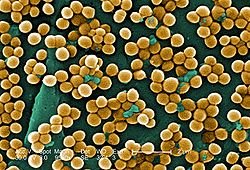You just saw one of the most delicious and simple dishes of Venezuelan cuisine. No matter where in the world you are, sure there's a Venezuelan next to you craving for cachapas con queso de mano. Cachapas (yellow corn "pancake" with the blackish crust) are easy to make, what is almost impossible to get abroad is the white cheese that gives this dish the unique salty flavor that no other kind of cheese has. Why is this product so hard to be exported/imported?
It's Hazardous
It's well known that cheese comes from milk and the process starts at the milking stage. In Venezuela, the vast majority of milk is obtained from manual procedures. The exposure of milk to the farmers bare hands represent a higher risk of contamination of the product. Milk is a perfect environment for bacteria to grow as it has the right temperature and minerals they need. One of the species that manifest in milk is Staphylococcus aureus, responsible of diseases like mastitis, acne and digestive intoxication.

Staphylococcus aureus under a microscope. Source
Other relevant thing is that about the 90% of the milk produced in Venezuela can be labeled as hot milk, this is the kind of milk that goes for at least 2 hours without receiving a cooling treatment in order to stop the bacteria growth right after the milking. The amount of risks hot milks represent makes diary products manufacturers to reject this raw material.
The farmers don't like to lose time, effort and money so they allocate this rejected milk to the makig of white cheese, without pasteurizing it. During this manufacturing, which is manual as well, cheese makers add great amounts of salt that end up killing some of the pathogens and deteriorative microbes, but S. aureus is tolerant to halides, so it will live on no matter the concentration of salt in the environment.
How do Venezuelans survive eating this cheese?
Venezuelans are nothing but used to eat this cheese. Our mothers eat it while pregnant, use it to make the first solid foods given to babies, and so on. The digestive and immune system can handle S. aureus with no problem, the problem comes with foreigners.
There's no kind of law that allows you to export or import a food product with that amount of pathogen bacteria on it. Any person who is not wonted to eat this kind of food is facing a high risk of digestive problems and other possible illnesses.
In fact, long ago, McDonald's had a breakfast menu which included arepas with cheddar cheese. This menu was a kind of a failure as Venezuelans naturally prefered arepas with white cheese, but an important chain as McDonald's couldn't afford to include hazardous ingredients and face possible lawsuits because of intoxications of customers or employees.

"McArepas" with non-white cheese. Source
That's why most of Venezuelans abroad has this strong nostalgia. Even when there are tons of typical Venezuelan food stands around the world, this kind of cheese is almost impossible to get.
Almost all information was brought to you thanks to Felix Millán who teaches the course An Introduction to Food Industry Technology at Universidad Simón Bolívar which I attend.
Other sources:
Hope you enjoyed.

Well that's damn nifty to know! If I ever visit Venezuela I'll make sure to try this dish, but probably start with small amounts.
I had a Surinamese friend that loved cachapas. He described tham as a piece of heaven in your mouth. I hope you like it but be careful with the cheese filling, haha.